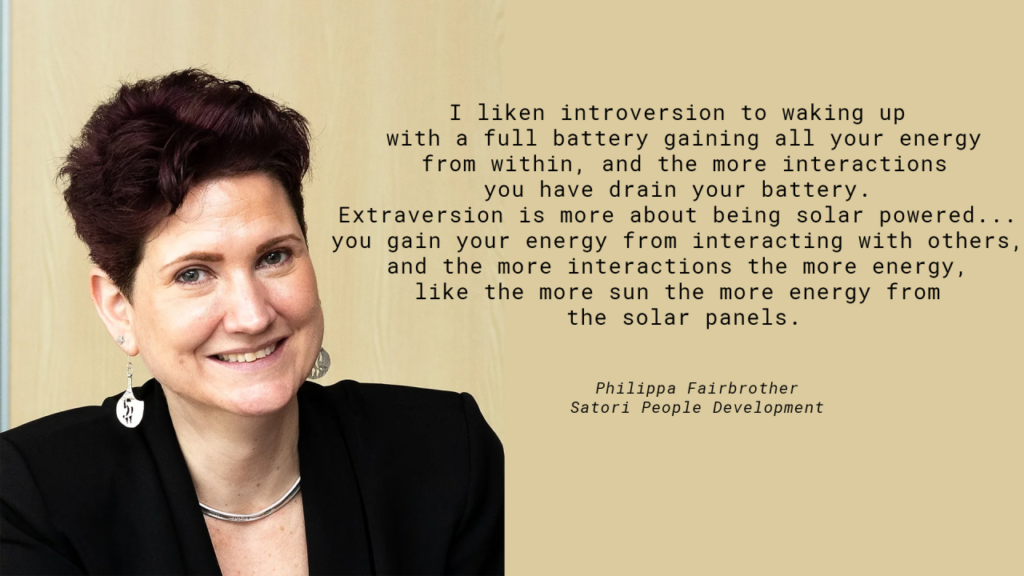If you want to achieve optimal performance as an introverted leader, it is important you recognise what factors contribute to you being at your best, and how to put them into practice.
Understanding what introversion means and that it is about how you interact with the world helps you to understand what gets in the way of you being at your best.
Energy is key
The key to achieving optimal performance is managing your energy. Understanding what energises you and what depletes your energy means you can put things in place to manage your energy levels throughout the day.
For many introverts, the work environment can be draining. When you feel drained of energy, you are not going to be at your best. And you are less likely to want to do those activities that expend energy, which may form a vital part of your role.
Philippa Fairbrother of Satori People Development who helps SME business owners improve their bottom line by making teamwork simple and effective, gave a great analogy that explains the difference in energy from interactions for introverts and extraverts:
I liken introversion to waking up with a full battery gaining all your energy from within and the more interactions you have drain your battery. Extraversion is more about being solar powered... you gain your energy from interacting with others, and the more interactions the more energy, like the more sun the more energy from the solar panels. - Philippa Fairbrother, Satori People Development
Activities where you are around people in environments with a lot of activity and noise, which don’t give you time to process information before speaking can be overstimulating and draining. Think meetings, open plan offices, networking, being constantly in the spotlight, and brainstorming.
Managing your calendar accordingly means you give yourself time to recharge throughout the day. Avoid back-to-back meetings and other back-to-back activities that are overstimulating. If these can’t be avoided, techniques such as mindfulness, breathing exercises, and going out for a walk in the fresh air at lunchtime can help you to feel more energised.
In addition to the overstimulation from the environment, managing your physical, mental, emotional, and spiritual energy plays a crucial role in you being at your optimal. When you are depleted in one area, it can have a negative effect on how you perform.
Physical: getting sufficient sleep, good nutrition, and exercise all contribute to you being at your optimal physically.
Emotional: managing stressful emotions, being present, and experiencing positive emotions contribute to being at your optimal emotionally.
Mental: managing irrational and unhelpful thoughts, sustained concentration, realistic optimism, are factors that contribute to you being at your optimal mentally.
Spiritual: being connected to your core values and living and working aligned to them, doing things that add meaning to your life, having a purpose that goes above your self-interest all contribute to you being at your optimal spiritually.
Manage your mindset
For many of us, the way that we think affects how we feel, and we act and behave according to how we are feeling. This is a result of the thoughts and beliefs that we hold. If you are worrying or stressed, it makes you feel anxious. If you are anxious, it negatively affects your performance and your being at your optimal.
If you change what you think and believe, you change how you feel. If you change how you feel, you change how you act and behave. Manage your mindset and you will notice a difference in how you perform.
Utilise your strengths
When we utilise our strengths, we are more likely to experience moments of psychological flow. Having moments of psychological flow enhances productivity, performance, and overall satisfaction.
We are more confident and more motivated when we are using our strengths. And don’t forget those strengths that are associated with introversion. Listening, empathy, creativity, and analytical thinking, are some of them.
Manage your workload
If you have a demanding workload, find ways to manage it. Worry, stress, and anxiety can make it more difficult to think rationally and find solutions to a demanding workload. Putting into practice what I have mentioned above will help you to rationalise your thinking and see things more clearly.
Identify the source of your demanding workload and whether this falls within or outside your control. If it is within your control, prioritise tasks and set realistic goals. Negotiate deadlines, delegate tasks, and get help if needed.
Do you need to improve your time management skills? Are you constantly dealing with interruptions. Take an objective look at how you are organising your work. If you are working excessive hours or multi-tasking, this can be counter productive.
Make time for self-reflection
Giving yourself the headspace to think and self-reflect is an investment in you that will pay off. Set regular time in your calendar for it, and make sure you protect that time just like you would any other meeting.
Having this time of self-reflection, helps to develop your self-awareness, making it easier to see things more clearly and rationally, and helps enhance productivity and performance. It helps you to see when you are at your optimal and when you are not, and the factors that contribute to this.
While you are making time for self-reflection, identify what boundaries you need to put in place, and make sure that you practice self-care. Because there is truth in the saying, ‘You can’t pour from an empty cup’.

